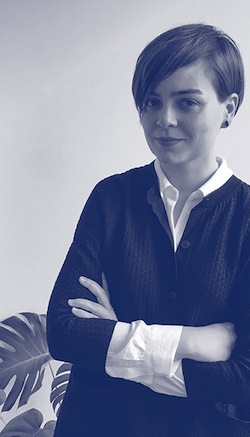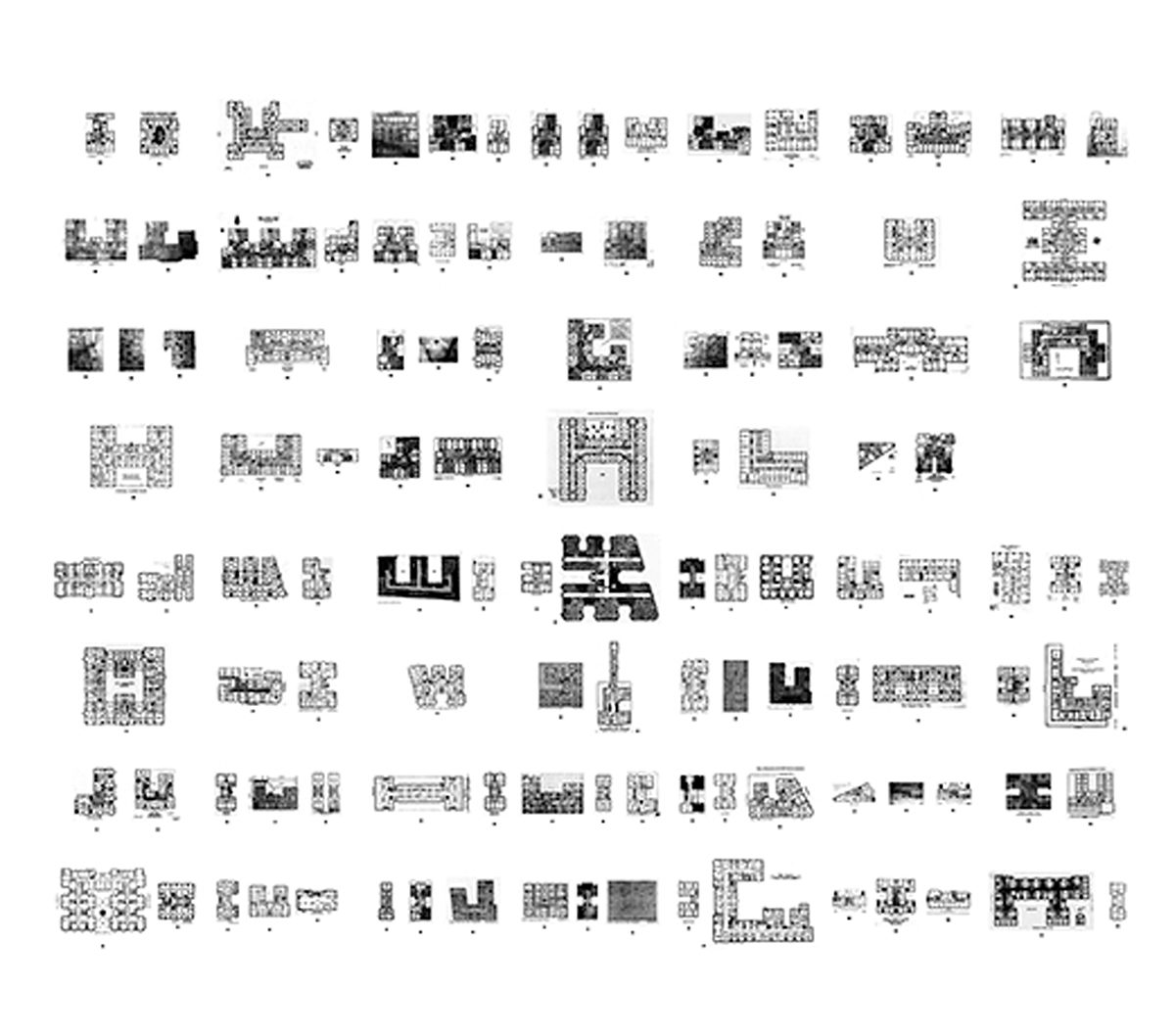
Anna Puigjaner, cofounder of Barcelona-based MAIO Studio, wins $100,000 travel grant for her proposal Kitchenless City: Architectural Systems for Social Welfare
The Harvard University Graduate School of Design is pleased to name Barcelona architect Anna Puigjaner the winner of the 2016 Wheelwright Prize, a $100,000 traveling fellowship aimed at fostering investigative approaches to contemporary design. Puigjaner is a graduate of the Escola Tècnica Superior d’Arquitectura de Barcelona-Universitat Politècnica de Catalunya (BArch 2004, MArch 2008, and Ph.D. 2014). In 2005, she cofounded MAIO Studio with partners Maria Charneco, Alfredo Lérida, and Guillermo López. MAIO operates as a collaborative studio and has completed several projects, spanning exhibition design, furniture, interiors, public spaces, urban planning, and architecture. In summer 2016, the firm will complete its first construction from the ground up, a 22-unit, 6-floor residential building in Barcelona.
 Puigjaner’s winning proposal, Kitchenless City: Architectural Systems for Social Welfare, takes as its starting point a historic housing type—housing blocks with collective kitchens, as well as other shared amenities such as dining rooms, lounges, and service areas. Puigjaner proposes to study exemplars of collective housing in Russia, Brazil, Sweden, China, Korea, and India, which reflect a variety of approaches to organizing and distributing domestic spaces. Noting that this housing type and notion of collective life were “deeply understood as a tool for social transformation,” she sees its relevance to today’s housing dilemmas and possible lessons for “renewed domestic proposals for the present.”
Puigjaner’s winning proposal, Kitchenless City: Architectural Systems for Social Welfare, takes as its starting point a historic housing type—housing blocks with collective kitchens, as well as other shared amenities such as dining rooms, lounges, and service areas. Puigjaner proposes to study exemplars of collective housing in Russia, Brazil, Sweden, China, Korea, and India, which reflect a variety of approaches to organizing and distributing domestic spaces. Noting that this housing type and notion of collective life were “deeply understood as a tool for social transformation,” she sees its relevance to today’s housing dilemmas and possible lessons for “renewed domestic proposals for the present.”
“Anna Puigjaner believes that architects should do more than simply design buildings and the spaces that surround them, but they should be concerned about the way people actually use those spaces,” remarked juror Rafael Moneo, Josep Lluis Sert Professor in Architecture. “Her motto—‘Architecture goes beyond physicality’—means that buildings should help people to make their lives more efficient. She seeks to endow architecture with the power to alleviate the burdens of our domestic life. The lightness, subtlety, and cleanliness that is always present in Puigjaner’s work allows us a glimpse of how she imagines this architecture should be, and anticipates the lines of investigation she will pursue on her travels with the Wheelwright Prize.”
The 2016 Wheelwright Prize jury praised Puigjaner for the relevance of her topic today, as rapidly urbanizing cities struggle to provide adequate affordable housing for their growing populations. The jury emphasized the importance of awarding a research project that could produce new forms of architectural knowledge, and noted in particular the pertinence of Puigjaner’s research to new housing development models as well as the rise of alternative sharing and resource-pooling economies. As in previous years, the competition received nearly 200 submissions from roughly 45 countries, and applications touched on a range of spatial, technological, and social issues.
The research builds on work Puigjaner initiated several years ago, while pursuing her Ph.D. She has published articles on the subject, contributing essays to Space Caviar’sSQM: The Quantified Home (Lars Muller, 2014) and Volume (2013, #. 3). Kitchenless Cityalso reflects MAIO Studio’s particular interest in flexible systems and the potential of variation, ephemerality, and appropriation. Its finalist submission to the MoMA PS1 Young Architects Program in 2014, Rooms: No Vacancy, designed with Fake Industries Architectural Agonism, consisted of a grid of rooms offering a succession of different atmospheres and moods. For the 2015 Chicago Architecture Biennial, MAIO createdFloating, a series of inflated columns that traveled throughout the Chicago Cultural Center. This drew from previous MAIO projects, Floating: Urban Activator (Barcelona, 2011) andUrban Space System (Barcelona, 2014), which utilized flexible devices to delineate new gathering spots or “monuments” in public spaces. The firm’s first building is, fittingly, a residential block that puts many of its ideas about open systems and changeability into practice.
Puigjaner and her MAIO partners combine design work with academic, research, and editorial activities. The studio currently directs the magazine Quaderns d’Arquitectura i Urbanisme. Their work has been published in magazines including Domus, AIT, Blueprint, A10 and Detail, and has been exhibited at the Art Institute of Chicago, Museum of Modern Art, and Venice Biennale. Puigjaner teaches at the School of Architecture of Barcelona and Massana School of Arts and Design, and she has lectured at the architecture schools of Columbia University, Yale University, Universidad Politécnica de Madrid, and Washington University, among others.
Her research itinerary begins with historical examples, such as the Kommunalkas, which began appearing in the Soviet Union after the revolution in 1917; and the projects spearheaded by Carmen Portinho, who directed Rio de Janeiro’s Popular Housing Department in the late 1940s and 1950s, including the large-scale Gávea and Pedregulho housing projects, both designed by Affonso Eduardo Reidy and completed in the early 1950s. Puigjaner will continue her research by visiting contemporary examples of alternative collective domestic architecture, such as the Sargfabrik complex in Vienna (BKK-2 Architectur, 1996), and Chinese entrepreneur Liu Yang’s You+ International Youth Apartments, affordable communal housing aimed at young adults, now in 14 cities in China. She will go on to study the collective solar kitchens in India and kitchenless housing developments in Korea and Japan.
The $100,000 prize will fund Puigjaner’s travel-based research over the next two years. Wheelwright Prize winners are invited to present their findings at Harvard GSD. The winner of the first edition in 2013, Brooklyn-based Gia Wolff, presented her researchFloating Cities at the GSD as part of the school’s Spring 2015 lecture series. The 2014 winner, Barcelona-based Jose Ahedo, will be featured in the GSD’s upcoming Fall 2016 lecture series.
2016 Wheelwright Prize Finalists
The Wheelwright Prize is now in its fourth year as an open international competition for early-career architects. This year, the Wheelwright Prize jury selected four finalists from among nearly 200 submissions. For the second year, finalists were invited to Harvard GSD to present their work and research proposals. Their presentations may be viewed here.
The 2016 finalists were:
SAMUEL BRAVO — Samuel Bravo Arquitecto, Santiago, Chile
BArch 2009, Pontifical Catholic University of Chile
Chilean architect Samuel Bravo has worked in a variety of contexts in South America, from Patagonia to the Amazon, exploring the relationship between traditional building practices and contemporary architectural production. He is a founding member of Tarapacá Project (2005–11), an initiative aimed at reconstructing heritage areas damaged by earthquakes. Since 2009, he has been working with the Shipibo, an indigenous community in the Amazon rainforest in Peru, designing the Ani Nii Shöbo Healing Center (2009–12), a shamanic lodge and retreat, and the Nii Juinti school (2014). His work was exhibited in the Architectural Biennale in Santiago de Chile (2008 and 2010) and the Venice Architecture Biennale (2010), and has been published in ARQ, CA, and Casabella. He teaches architecture at the Pontifical Catholic University of Chile.
Wheelwright proposal: Cultural Frictions: A Transference, From Traditional Architecture to Contemporary Production
MATILDE CASSANI — Milan, Italy
BArch 2005, Politecnico di Milano; Postgraduate degree 2011, Universitat Politècnica de Catalunya; Ph.D. 2013, Politecnico di Milano
Matilde Cassani’s practice encompasses architecture, installations, and exhibition curation. She has a particular interest in the spatial implications of cultural pluralism in the contemporary Western urban context. Her projects include Sacred Spaces in Profane Buildings, an exhibition at Storefront for Art and Architecture in New York (2012) which explored the impact of religious diversity on the contemporary city; and Countryside Worship, her contribution to Monditalia at the Venice Architecture Biennale (2014), an image that showed alternating views of the Italian countryside, empty and full of worshippers. Her work has been published in Architectural Review, Domus, Abitare, Arkitecktur, and MONU. She has been an artist-in-residence at Akademie Schloss Solitude in Stuttgart (2011) and the Headlands Center for the Arts in Marin, California (2012). She has lectured internationally and currently teaches at the Politecnico di Milano.
Wheelwright proposal: Once in a Lifetime: The Architecture of Ritual in Pilgrimage Sites
PIER PAOLO TAMBURELLI — baukuh architects, Milan and Genoa, Italy
MArch 2002, University of Genoa; Advanced MArch 2004, Berlage Institute
Pier Paolo Tamburelli is the cofounder of baukuh, a firm that has realized a wide range of work, including public and mixed-use buildings, historic renovations, master plans, and exhibition designs. Key projects include the library for the Genoa Chamber of Trade (2009), the Italian Pavilion for the Shanghai Expo (2010), and an apartment block in Tirana, Albania. baukuh participated in the Rotterdam Biennale (2007 and 2011), Istanbul Biennial (2012), Venice Architecture Biennale (2008 and 2012), and Chicago Architecture Biennial (2015). Tamburelli worked with Domus (2004–07) and is one of the founding editors of the magazine San Rocco. He has lectured at the Architectural Association London, University of California at Berkeley, Cornell University, ETHZ Zurich, Kunsthal Rotterdam, MAXXI Rome, and Tongji University, among other places. He is currently a visiting professor at the Politecnico di Milano.
Wheelwright proposal: Wonders of the Modern World
The full winner’s brochure, which includes juror quotes and the winner’s portfolio, may be downloaded from wheelwrightprize.org.
The 2017 Wheelwright Prize will begin receiving applications in December 2016.
INQUIRIES:
Cathy Lang Ho
[email protected]
Media handles: @HarvardGSD, @CathyLangHo, #WheelwrightPrize
